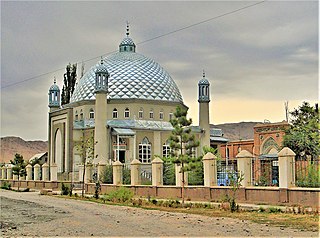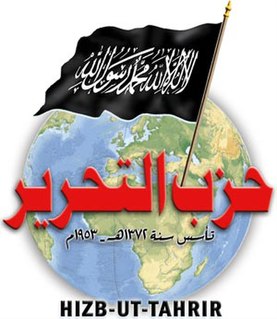Related Research Articles

The Islamic Movement of Uzbekistan was a militant Islamist group formed in 1998 by Islamic ideologue Tahir Yuldashev and former Soviet paratrooper Juma Namangani; both ethnic Uzbeks from the Fergana Valley. Its original objective was to overthrow President Islam Karimov of Uzbekistan and create an Islamic state under Sharia; however, in subsequent years, it reinvented itself as an ally of Al-Qaeda. The group also maintained relations with Afghan Taliban in 1990s. However, later on, relations between the Afghan Taliban and the IMU started declining.

Hizb ut-Tahrir is an international political organization which describes its ideology as Islam, and its aim the re-establishment of the Islamic Khilafah (Caliphate) to resume Islamic ways of life in the Muslim world. The caliphate would unite the Muslim community (Ummah) upon their Islamic creed and implement the Shariah, so as to then carry the proselytizing of Islam to the rest of the world.
Akromiya is an Islamist organization founded by Akrom Yo‘ldoshev.

Human rights in Kyrgyzstan improved after the ouster of President Askar Akayev in the 2005 Tulip Revolution and the installment of a more democratic government under Roza Otunbayeva. While the country is performing well compared to other states in Central Asia, many human rights violations still take place. Especially LGBT rights have been getting worse in recent years, freedom of press on the contrary has been improving.
Hizb-an-Nusra is an Islamist organization which the Government of Uzbekistan considers to be terrorist in nature that has operated in Uzbekistan since 1999. The group was founded by Mirzazhanov Atoyevich. Some Members of Hizb ut-Tahrir, an international organization dedicated to establishing a unified Islamic state across the Muslim world, created Hizb-an-Nusra in Tashkent out of dissatisfaction with Hizb ut-Tahrir's inability to overthrow the Government of Uzbekistan.

A. Elizabeth Jones served as the U.S. Ambassador to Kazakhstan, from 1995 to 1997. She served as the U.S. assistant secretary of state for Europe and Eurasia in 2003. She was promoted to the rank of Career Ambassador in 2004.
Terrorism in Central Asia is largely a cross-border phenomenon. The source of most terrorists and terrorist organizations that operate in Central Asia is Afghanistan due to the former presence of the Taliban and Al Qaeda militants, and the Ferghana Valley due to the Tajik Civil War.
Prior to the 2001 invasion of Afghanistan, the Islamic Movement of Uzbekistan (IMU) posed the greatest threat to the Karimov administration. In 2002 the IMU was reclassified as terrorist by the United States. Since the invasion, the IMU has been greatly weakened due to US military actions which cut off its supply of resources and killed its leader, Juma Namangani.
Terrorism in Tajikistan stems largely from the forces of the political opposition who opposed the comprehensive peace agreement that ended the civil war in 1997. President Emomali Rahmonov and UTO leader Said Abdullah Nuri signed the agreement on 27 June, believing it would bring an end to hostilities. However, dissident Islamist militants led by Tohir Yo‘ldosh and Juma Namangani formed the Islamic Movement of Uzbekistan in 1998, allying with Al-Qaeda and vowing to unite Central Asia as an Islamic state. The latest terror attacks took place in the Qabodiyon District on November 6, 2019, when a policeman and a border guard were killed by several Islamic State militants. 15 terroristi were also killed.
Igor Rotar is a Russian journalist. From 2003 to early 2007 he was the Central Asian news correspondent for Forum 18, a human rights organization based in Norway that promotes religious freedom. He is a Russian citizen.
The threat of terrorism in Kazakhstan plays an increasingly important role in relations with the United States which in 2006 were at an all-time high. Kazakhstan has taken Uzbekistan's place as the favored partner in Central Asia for both Russia and the United States. Kazakhstan's counter-terrorism efforts resulted in the country's 94th ranking among 130 countries in the 2016 Global Terrorism Index published by the Institute of Economics and Peace. The higher the position on the ranking is, the bigger the impact of terrorism in the country. Kazakhstan's 94th place puts it in a group of countries with the lowest impact of terrorism.

The Central Asian Union (CAU), later called the Central Asian Economic Union, was an intergovernmental organisation for economic integration between the Central Asian post-Soviet republics of Kazakhstan, Kyrgyzstan and Uzbekistan between 1994 and 2004. Tajikistan joined the Union in 1996 as an observer. Several proposals to restore the Union have been put forward since its dissolution.
The Constitution of Kazakhstan provides for freedom of religion, and the various religious communities worship largely without government interference. Local officials attempt on occasion to limit the practice of religion by some nontraditional groups; however, higher-level officials or courts occasionally intervene to correct such attempts.

Islam is the main religion in Kyrgyzstan and the constitution guarantees freedom of religion. Kyrgyzstan is a multicultural and multi religious country with Islam, Buddhism, Baháʼí, Christianity, Judaism, and other religions all having a presence in the country. Muslims constitute the main religious group in Kyrgyzstan with about 90% of the population as of 2017.
On 13 May 2005, protests erupted in Andijan, Uzbekistan. At one point, troops from the Uzbek National Security Service (SNB) fired into a crowd of protesters. Estimates of those killed on 13 May range from 187, the official count of the government, to several hundred. A defector from the SNB alleged that 1,500 were killed. The bodies of many of those who died were allegedly hidden in mass graves following the massacre.
The fight against terrorisminAzerbaijan is one of Azerbaijan's declared priorities. International organizations banned as terrorist include Al Qaeda, Al-Nusra Front, Azerbaijani Jamaat, Hizb ut-Tahrir, Islamic International Brigade, ISIS, Jeyshullah, and PKK. According to the Global Terrorism Database, seven people have been killed and over 20 injured in terrorist attacks from 2000 to 2015.

The Imam Bukhari Jamaat is an Islamist Salafi group fighting in the Syrian Civil War and the War in Afghanistan, composed of primarily Uzbeks, and expressing loyalty to the Taliban movement. The group originally operated only in Syria, where it is allied with other jihadist organisations such as al-Nusra Front and Ahrar ash-Sham, and alongside these other groups it makes up the Army of Conquest, which overran much of Idlib province in north Syria in 2015. Since late 2016, the group has also began to fight against Afghan National Security Forces, and has claimed to have set up training camps in northern Afghanistan.

Hizb ut-Tahrir Britain is the British branch of Hizb ut-Tahrir, a transnational, pan-Islamist and fundamentalist group that seeks to re-establish "the Islamic Khilafah (Caliphate)" as an Islamic "superstate" where Muslim-majority countries are unified and ruled under Islamic Shariah law, and which eventually expands globally to include non-Muslim states such as Britain.

Hizb ut-Tahrir is a pan-Islamist and fundamentalist group seeking to re-establish "the Islamic Khilafah (Caliphate)" as an Islamic "superstate" where Muslim-majority countries are unified and ruled under Islamic Shariah law, and which eventually expands globally to include non-Muslim states. In Central Asia, the party has expanded since the breakup of the Soviet Union in the early 1990s from a small group to "one of the most powerful organizations" operating in Central Asia. The region itself has been called "the primary battleground" for the party. Uzbekistan is "the hub" of Hizb ut-Tahrir's activities in Central Asia, while its "headquarters" is now reportedly in Kyrgyzstan.

Uran Toktonazarovich Botobekov (born on May 1, 1967, Malkaldy village – is a Kyrgyz scholar, journalist, diplomat and publicist, as well as a Doctor of Political Sciences. He was an opposition activist until 2016 when he emigrated. He is also the author of more than 60 scientific and analytical articles on politics, religion and economy of the post-Soviet Central Asian states. His scientific works were published in magazines in Russia, Turkey, Ukraine, Kazakhstan, Japan, USA, India, China, Vietnam, Germany and Kyrgyzstan etc.
References
- ↑ Central Asia: China brings electronics, but not Democracy RadioFreeEurope/RadioLiberty
- ↑ The future of Islamic radicalism and religious freedom in Central Asia Archived 2007-01-21 at the Wayback Machine Moldova
- ↑ Central Asia: Tashkent And Bishkek working to combat 'terrorism' RadioFreeEurope/RadioLiberty
- ↑ Kazakhstan: Government moves to add Hizb ut Tahrir to list of terror groups RadioFreeEurope/RadioLiberty
- ↑ Kyrgyz official says Hizb Ut-Tahrir key threat RadioFreeEurope/RadioLiberty
- ↑ Five killed in counterterrorism raid in Kyrgyzstan RadioFreeEurope/RadioLiberty
- ↑ Kyrgyz Parliament rejects Kulov's nomination as Prime Minister RadioFreeEurope/RadioLiberty
- ↑ Prosecutor General requests ban of Hizb-ut-Tahrir Embassy of Kazakhstan to the USA and Canada